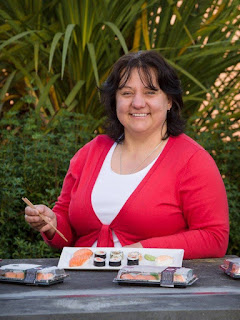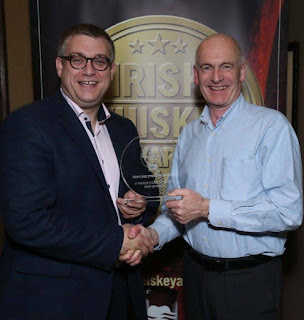From baby food to breweries, and steaks to sushi, small local producers are gaining support by producing quality goods.
GLORIOUS SUSHI LTD
Tetyana Zhemerdyey, originally from Ukraine, started Glorious Sushi after finding that she was unable to buy Japanese food after moving to Ireland.
Biography: A small company based in Waterford, producing a range of Japanese foods for the Irish market.
It is a reflection of Ireland’s changing palate that a company producing sushi in Waterford is going from strength to strength.
When Tetyana Zhemerdyey moved to Ireland from Ukraine, she already had a passion for Japanese food but found herself unable to buy it here.
“In my early 20s, I worked part-time in a sushi bar called Yakitoria. My passion for sushi and everything Japanese flared and became somewhat of an obsession.
“I’d practise endlessly making classic sushi rolls and Asian salads at home while perhaps inventing some new ones along the way.
“After moving to Ireland and working in a local factory, I kept remembering about how much I loved making sushi for my family and friends. There was no sushi bars, and no store sold anything Japanese food-related. That’s when I saw my opportunity,” she says.
Tetyana already had a degree in marketing and, after undertaking a Waterford Area partnership course, started the company Glorious Sushi in 2011.
She continued to grow her knowledge by taking specialised courses in Asian food in the UK.
The business expanded from its beginnings in her family kitchen to a factory in Dunhill, despite initial reluctance from some.
“It was tough going in the beginning, with many sleepless nights trying to create what sushi I’d want to impress my customers with as many were a bit sceptical of trying sushi for the first time.
“After a while, our sushi were gaining popularity, with us having tasting days in various stores where a customer could sample the produce before purchase, but also really taking control of social media,” she says.
The hard work has paid off, with Glorious Sushi now supplying SuperValu stores around Munster as well as some independent shops and fishmongers.
They also supply products to Aldi stores, making a little taste of Japan available nationwide.
WHITE DEER BREWERY
Don O’Leary and Gordon Lucey of White Deer Brewery, Ballyvourney, Co Cork. They started their 9 White Deer Brewing Company with one product, Stag Ban IPA, in June 2014.
Biography: Based in the West Cork Gaeltacht, this recently-opened brewery is producing a range of beers, ales and stouts for the Irish market.
Engineer Gordon Lucey and publican Don O’Leary have found growing success in the brewing market, thanks to a carefully planned rollout and a focus on responding to customer demand.
Gordon developed an interest in brewing while working in various locations abroad over the years and joined up with Don, owner of The Mills in Ballyvourney, Co Cork, to see if they could make a serious business of producing craft beers.
Their research persuaded them they could and they started their 9 White Deer Brewing Company with one product, Stag Ban IPA, in June 2014.
“Rather than launching with six beers, we knew we’d have to put a lot of effort in to get one up and running — getting it right and getting it accepted,” Gordon explains.
Despite their determination to take their time and manage each stage, their range has expanded rapidly, to six, including the award-winning Saor, a gluten-free beer. “No one knew it was a gluten-free beer at the Blas na hÉireann awards, because it’s blind tasting. It is a good beer that just happens to be gluten free.”
They have received such a positive reception to Saor they are planning a range of five gluten-free products, including a red ale and an IPA.
“Feedback has been unreal, every week we are getting emails from people saying thank you. They were sick of drinking cider or wine at barbecues.
“It’s kind of our niche in the market, it’s something we looked at from the start as Don is gluten intolerant. We’ve grown it nurtured it. Everyone has a unique selling point and ours is that.
“Rather than make what we think people want, we’ve decided to make what people actually do want. It’s working and we feel that this range will add a lot to our portfolio,” Gordon says.
POITÍN TODDY MARMALADE
Betty Smith, co-owner of A Taste of Irish Spirit with her selection of award-winning marmalade at her home in Newcestown , Co Cork. Picture: Eddie O’Hare
Biography: An award-winning range of marmalades, produced by husband and wife team Betty and Jim Smith from their home near Bandon in Cork.
Anyone interested in a cottage industry making jams should consider heading to Bandon, Co Cork, although they will have to prepare for a lengthy apprenticeship.
Making Poitin Toddy Marmalade keeps Betty Smith, 80, and Jim 83, busy, but despite their ages, they have no desire to stop anytime soon.
Their enthusiasm might be traced back to having only come to their thriving business in retirement.
Betty laughed when I asked if about a background in food preparation. The former scientist says: “I’m not a cook, I’m not that domesticated.”
Their first batch was created to help get them out of a financial sticky spot. “We ran up a large vet bill for one of our dogs and couldn’t pay it. We had a bottle of (legal) poitín at home so that was the start of it.”
The marmalade proved so popular that they have since expanded their range to include a version with cinnamon and cloves and another with ginger. They are all selling well and particularly popular with tourists.
“They don’t understand initially what poitín is but once you explain it they love it. American tourists, once you mention moonshine they know exactly what it is,” says Betty.
The original bottle is long gone, and they now source poitín from West Cork Distillery in Skibbereen.
However, all manufacturing still takes place at their home in Bandon. Their main outlets are Supervalu stores in Cork although they also supply some independent shops in the county. And Betty believes there is plenty of potential for their award-winning product.
“I don’t really know how to go about handing it over or selling it on but the potential is great. We’re in Supervalus in Co Cork but that’s just one county. We’ve got all the rest to go at,” Betty says.
DINGLE DISTILLERY
Elliot Hughes from Dingle Distillery. Picture: Sasko Lazarov/Photocall Ireland
Biography: An Irish-owned distillery using Kerry spring water to create a range of whiskeys, gin and vodka.
Entrepreneur Oliver Hughes built his Porterhouse business up through brewing and bar ownership before making a detour to the top shelf.
The former barrister had kept a house in Dingle for many years and saw the Kerry town as a natural home for a distillery. And when he brought a Scottish expert on board to help, the Dingle location worked its magic on him too.
“Oliver took on the services of John McDougall to help, who had a 50-odd year career in distilling in Scotland,” explains Dingle Distillery general manager Mary Ferriter.
“John came to Kerry and fell in love, not with the scenery but with the fog and the wind and rain. He was very excited about the quality of the water. So a decision was made to create a triple-distilled single malt whiskey.”
Dingle Distillery uses Kerry spring water to create a range of whiskeys, gin and vodka
Production began in November 2012 with the first cask filled the following month. With a three-year wait for the spirit in the casks, the company turned their hands to gin and vodka.
Mary again credits the Kerry spring water for being the crucial component in their five-times distilled award-winning vodka and gin that promise a taste of the Kerry landscape.
In December 2015, the first whiskey casks were opened and the company released its first batch of single-malt whiskey, with more to come in limited amounts in 2107.
The company suffered a tragic loss this year while they waited for their first batch to mature, with the unexpected death of Mr Hughes at the age of 57.
But the legacy he left behind in Dingle is deeply appreciated.
“I liken him to a farmer, he came here to west Kerry and he dug up deep. There is a craft here now that will go from father to son, please God,” says Mary.
PIP & PEAR
Irene Queally of Pip & Pear, Chilled baby food, says people want real food for their babies. She believes texture is as important as taste, which is reflected in the products produced by the company.
Biography: Started in 2014, Pip & Pear has grown from a menu served in a single restaurant in Waterford to producer of broad range of baby and toddler foods sold nationwide.
Irish baby food company Pip & Pear originated when founder Irene Queally started her family with husband Bill, and found the food available to buy far from what she would choose to feed her babies.
“When my own children were born, I didn’t feel like anything that was in the market was close to the kind of food that I would eat and feed the kids, it just wasn’t the same quality or flavour. It all started from there,” says Irene.
Irene and Bill also own the No 9 Barronstrand Street restaurant in Waterford. She began using the restaurant kitchen at night to prepare her own recipes and they decided to offer a limited menu for babies.
Despite the meals being in competition with free baby bowls, the initial range of five choices was hugely popular.
“I think now more than ever people want real food for their babies. People were buying multiple portions to takeaway and use at home or freeze.”
The feedback was so positive she entered the Blas na hÉireann awards, where they won Gold at their first attempt and also met with supermarket buyers.
Three years on and their range is now stocked in SuperValu and Aldi, with Tesco due to come on board in 2017.
The initial five recipes have grown to a broad range catering for babies and toddlers up to three years.
Irene believes texture is as important as taste, and that is reflected in the company’s products as children mature through the age ranges.
“A lot of pouches and jars, they’re blitzed to nothing so there’s no chewing involved and babies need that for development.
“So we start with a puree but then move to a mashed consistency. And because of feedback from mums, we’ve added a toddler range from one to three, which is much chunkier in texture,” Irene said.
J&J O’LEARY FAMILY BUTCHERS
Biography: Millstreet butchers who have built up a national reputation thanks to an award-winning and constantly evolving product range.
Brothers James and Jerry O’Leary took over the thriving butchers shop from their father but have added their own stamp with their prepared meats and award-winning sausages and burgers.
Despite only selling products from their premises in Millstreet, O’Leary’s have developed a range impressive enough to have claimed a number of national prizes.
“We took the business over from my father 15 years ago, we’ve been butchers all our lives,” Jerry says.
“In the last few years we’ve gone through a transition into more value-added products, trying to hold on to our traditional butchers business but also trying to change things around. What chefs have done to restaurants, we’re trying to bring to the butchers. We try to make it flashier and fancier and also make it easy for people to cook. So we’re always coming up with new products.
“This year we introduced our mushera venison burger, coming from the Millstreet National Park.”
They have also seen a growing trade in prepared meals, with O’Leary’s doing the hard work for their customers. They change their range constantly, but offer shoulder of lamb as a recent example.
“That product we marinated for a week first, with all our own herbs and spices. Then we vacuum pack it in a roasting bag and all the customer has to do is go home and put it in the oven. It’s taking restaurant-style cooking to the home and keeping it simple.”
Their innovation has seen them reaping awards on a regular basis, with the venison burger earning a gold Blas na hÉireann award at this year’s competition.
Given the success, have they considered branching out into supplying other business?
“No, I’m a bit selfish like that,” Jerry jokes. “I keep them to myself.”
WESTERN HERD
Biography: A Clare microbrewery producing a range of beers and ales on their converted family farm.
Clare siblings Maeve Sheridan and Michael Eustace have found success bringing an American west coast beer sensibility to the west of Ireland.
Maeve was living in Luxembourg but keen to move home with her family, while Michael managed a bar in Dublin.
Noticing the growth in craft brewing around Ireland, the brother and sister decided that was a possible use for the outbuildings on their farm in Kilmaley, which has been in the family for eight generations.
“The hay shed is nearly 100-years-old so it was nice to repurpose it,” Maeve says. “We have all the brewing equipment in there. We broke through into the milking parlour and we have our labelling machine, a bottling line and cold storage in there.”
There’s little waste, with the spent grain being fed to cattle still kept on the farm.
With no direct brewing experience, the siblings knew the had a lot to learn: “It’s like a home cook trying to open a Michelin star restaurant.”
They enlisted a master brewer from the US who spent a year working with them and an apprentice they took on under the now-defunct Jobbridge scheme.
With his help they started brewing, and have found a ready market for the products on their doorstep.
“There was no one in Clare doing it [craft brewing], even though more than a million tourists pass through the county each year,” Maeve explains.
Maeve says they can tell a bar’s tourist profile from the beers that sell well there. “In O’Connors in Doolin, it’s all IPA for the Americans, while in Spanish Point, it’s the wheat beer and Foxcatcher for the Germans and French.”
Not that they are neglecting their west of Ireland base — one of their most popular brews is Blue Jumper IPA, a Father Ted reference and the perfect nod to the locals.
ST PATRICK’S DISTILLERY
Biography: Incorporated in 2014, the company are based in St Patrick’s Mills in Douglas and are producing a growing range of high-quality spirits.
St Patrick’s Distillery’s business idea was born from the growing market for gluten-free products but the business have found that exceptional flavour is the real driver of their business.
Founder Tom Keightley worked in the pharmaceutical industry and saw the growth of products catering to those with food intolerance. The company started producing gin and vodka made from a product that has zero gluten — potato.
General manager Cyril Walsh says no sooner had they catered to that demand, when another appeared.
“As soon as we ht the market with product, we were asked straightaway about whiskeys. Clearly whiskeys are not gluten-free so we outsourced elements of production, although we retain key control areas like blending.
“We started with oak-aged Irish whiskey, which was very well-received and we now have a total of three whiskeys, including a single malt and a cask-strength whiskey.”
The company concentrate on the export market, with their name an invaluable marketing tool, particularly in the US where they intend to focus for 2017.
“Having a strong brand name like St Patrick’s Distillery, we believe we have a great opportunity to capitalise on the awareness of St Patrick as intrinsically Irish and instantly recognisable.
“We’re very fortunate to be able to trademark the name; the fact that we’re based in St Patrick’s Mills in Douglas probably helped in that regard,” Tom says.
Their next product launch also harks back to Irish tradition, a 50% proof poitín distilled from a traditional recipe of malted barley and potato.
“We’re using a traditional recipe, from Croagh Patrick in Mayo, where poitín has been produced for millennia.”
Grainne McGuinness
















